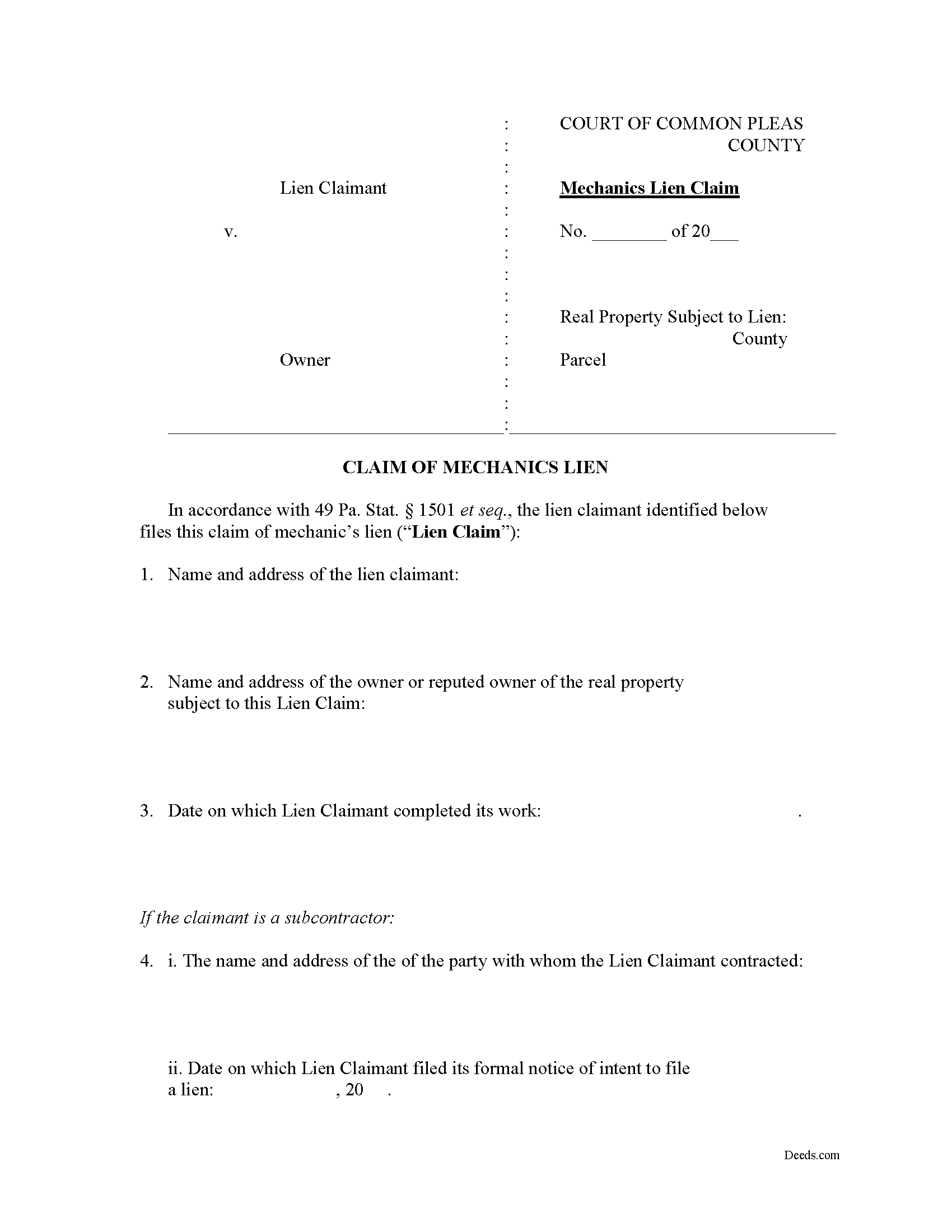Download Pennsylvania Claim of Mechanics Lien Legal Forms

Pennsylvania Claim of Mechanics Lien Overview

Obtaining a mechanic's lien in Pennsylvania
Mechanic's Liens are governed by Title 49 of the Pennsylvania Consolidated Statutes.
A mechanic's lien is a type of security interest used to guarantee payment for work completed or materials delivered in connection with a construction contract. You might be familiar with other types of liens such as a judgment lien or tax lien. A mechanic's lien works the same way by attaching itself to the title (ownership) interest of the property and making it difficult for the owner to sell or refinance without first resolving the lien. Therefore, it's a powerful tool when it's used properly.
In Pennsylvania, the procedure for obtaining and enforcing a mechanic's lien is governed under the Mechanic's Lien Law of 1963 (49 P.S. 1101). Liens are available to general contractors, subcontractors, laborers, and material or equipment suppliers who meet the requirements for filing including sending the necessary notices of commencement and furnishing as well as the preliminary (pre-lien) notice.
A lien can be claimed for unpaid labor or materials provided for the construction, alteration, or repair that exceeds a value of $500.00 (301). The lien must reflect only the actual costs of labor or materials as well as lost profits and overhead. You cannot include items such as delay or impact damages from breach of the contract (although you may recover these in a separate lawsuit on the underlying contract).
The lien must also be filed no later than six (6) months after the lien claimant has completed work (502(a)(1)). Be sure to check the filing requirements for the clerk of courts in the county in which the property is located. You may be required to attach a cover sheet or additional documentation. Review the requirements by visiting the local court's website.
The claim for lien must include the following: (1) The name of the party claimant, and whether he files as contractor or subcontractor; (2) the name and address of the owner (or reputed owner); (3) the date on which the claimant completed its work; (4) if the claimant is a subcontractor, the name of the person with whom the claimant contracted, and the date on which the formal notice of intention to file (if required) was given; (5) if the claimant is a general contractor under a contract or contracts for an agreed sum, an identification of the contract and a general statement of the kind and character of the labor or materials furnished; (6) if the claimant is either a subcontractor or a general contractor who is not under a contract for an agreed sum, a detailed statement of the kind and character of the labor and/or materials furnished and of the prices charged for each of them; (7) the amount or sum claimed to be due; and (8) a description of the improvement and of the property claimed to be subject to the lien, as reasonably necessary to identify them. (503)
After filing, the claimant must serve the lien on the owner. Service is a necessary part of due process that allows the owner to receive notice of the pending action and an opportunity to contest it. The traditional method for serving liens in Pennsylvania is by sheriff's service, although private process servers may also be employed. Not later than twenty (20) days after the lien claim has been served upon an owner or (where applicable) posted upon the improvement, the lien claimant must file with the prothonotary (clerk of courts) either an affidavit of service or a document signed by the owner accepting service (502(a)(2)).
Once you have your lien in place, you must sue to foreclose on the lien if the owner (or reputed owner) still hasn't paid. An action to obtain judgment upon a claim filed shall be commenced within two (2) years from the date of filing unless the time be extended in writing by the owner (701(b)).
At any time after the completion of the work by a subcontractor, any owner or contractor may file a document with the court called a "rule" which orders the lien claimant to file lawsuit foreclosing on the lien within twenty (20) days of the rules service on the claimant (506(a)). If the claimant fails to file suit within that time, the lien is declared invalid.
This article is provided for informational purposes only and does not constitute legal advice. Contact an attorney with questions about the Claim of Lien, or with any other issues related to mechanic's liens in Pennsylvania.